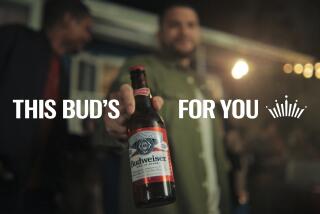Should Ads for Liquor Be on TV, Radio?
- Share via
Recently, the Distilled Spirits Council announced that it was ending a 48-year voluntary ban on TV and radio liquor advertising.
Although the four major networks have said they still will not accept liquor ads, the move is sure to push forward a debate on whether legal restrictions against such ads are needed.
A major part of the debate centers on what impact such advertising has on children. But advocates point to the unfairness of allowing beer and wine ads but not ads for liquor.
Should ads for hard liquor be allowed on TV and radio?
Xavier Flores, executive director of Pueblo Y Salud, a San Fernando-based social service agency dealing with alcoholism:
“It’s our position that advertising does impact individuals who have never drunk before. I say that because the advertisers are always telling us they are not advertising to attract new consumers, that what they are doing is simply trying to get consumers to change their brand. We believe that is totally false. . . . Our own experience as people who work in the alcohol prevention field . . . is that there is a direct correlation between advertising and consumption. . . . Very soon, you’re going to be seeing cartoon characters attached to advertising. They’re doing this because they’re desperate. Studies are showing their population is decreasing. . . . They are looking to expand among women, minorities and youth.”
Elizabeth Board, director of public issues for the Distilled Spirits Council of the United States:
“Absolutely. Responsible advertising, targeted to responsible adults, should definitely be on television, just as beer and wine has been for decades. . . . The content must be responsible and . . . focused on adults. . . . There are 100 million adult Americans who drink responsibly in the United States. That figure is not going to change as a result of advertising. . . . People who do not drink are not swayed by advertising. . . . The biggest influence on children has been peer pressure and parental guidance.”
Carla Glasbrener, acting president of New Directions for Youth:
“I believe that advertising on TV can negatively impact kids. . . . Kids in general are easily influenced. When my own daughter sees an advertisement for a toy, she wants it. . . . I think it’s a number of factors that cause kids to drink. I think advertising is one of them.”
Albert Lizer, a Studio City liquor broker who deals with promotions:
“A lot of people in our industry feel they shouldn’t do it this way [restricting ads for liquor but not beer or wine]. . . . I’m a firm believer in moderation of anything and being very careful. . . . What a lot of people don’t realize is if you drink a tall vodka tonic, that’s less than an ounce of alcohol. That’s not any different than beer or a glass of wine as far as alcohol content. . . . I don’t really think it’s going to affect young people drinking, one way or the other. . . . I’m not opposed to a total ban [of all alcohol ads]. . . . [But, on allowing ads for beer and wine but not hard liquor] I have mixed emotions because I feel then you’re talking out of two sides of your mouth.”
On the Issue appears every Tuesday. Please send suggestions for possible topics to On the Issue, Los Angeles Times, 20000 Prairie St., Chatsworth 91311. Or fax them to (818) 772-3338. Or e-mail them to valley@latimes.com Please include your name and daytime phone number.


